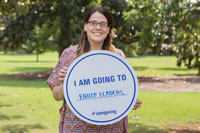Q & A with Lizette Beard
CHRIS MARTIN | January 19, 2017

Q. Where are you currently serving?
A. For the last six years, I have served as a project manager at LifeWay Research in Nashville, Tennessee. I work with our online assessment tools and coordinate research projects. I also do a lot of qualitative research, which includes focus groups and interviews.
Q. What are you studying at Southeastern?
A. I am in the Ph.D. program in applied theology and specifically, the North American missiology cohort. We all work full time, live in different places around the country, and we come to Southeastern a couple times a year to work together.
Q. Why Southeastern?
A. I was interested in the flexibility offered in the cohort Ph.D. program because I knew I wanted to do my Ph.D. but I didn’t want to leave LifeWay or relocate in order to do it. Also, I was looking for a school that is just as committed to applying theology as it is teaching theology.
Q. What was your most influential moment at Southeastern?
A. This past January, in our ecclesiology seminar with Dr. Hammett I finally felt like the hard work of the Ph.D. program was paying off and I was seeing how the all of the pieces we learned in other classes were beginning to come together. Ecclesiology is where theology and practice meet.
Q. What is the greatest joy that you have as a researcher?
A. I love interacting with church planting organizations and helping them analyze church planting research and learn to use our assessment tools.
Q. What challenges do you face in your role as a researcher?
A. Working on the same project for an extended period of time is really difficult for me. Thankfully, at LifeWay Research, we get to change projects quite frequently, but sometimes when I’ve been working on one project for an extended period of time, it can get challenging to stay interested and focused on the same material.
Q. What advice do you have for current and future students who work full time?
A. It’s important to have a really good idea of why you’re pursuing your degree. I would encourage students to not get so engrossed in seminary culture that you are divorced from other areas of your life in which you may be able to apply some of what you’re learning. I think seminary students, especially those of us working full time jobs, need a balance.
Q. What do you enjoy doing in your free time?
A. I am a new gardener, so I’ve had a lot of fun learning how to plant flowerbeds and grow tomatoes and other plants. I’m learning the hard way that you can’t grow tomatoes too close together.
Q. What are a couple books that everyone should read?
A. “The Drama of Scripture” by Craig Bartholomew and Michael Goheen does an excellent job showing the grand narrative of Scripture. “God at Work” by Gene Veith explains the doctrine of work and has had a big personal effect on me.
Q. What has God been teaching you lately?
A. That I’m not spending enough time reading His Word. Since I’ve been in seminary, my time in the Word has increased, but recently I haven’t been in it nearly as much as I’d like to be. I’ve just been so caught up in work and school that I was recently convicted God’s Word had become increasingly scarce or something I was “fitting in.”
Q. Southeastern is known as a Great Commission seminary, how did Southeastern prepare you to fulfill the Great Commission?
A. Southeastern is not only known as a Great Commission seminary, it actually is a Great Commission seminary. We are constantly confronted with the question, “Why does this matter?” Southeastern and its faculty make their students not only learn theology, but also apply theology. Since being a student at Southeastern, I have been challenged to reach out to and love my neighbors, people literally living in my neighborhood.
Q. How has Southeastern equipped you to live out your faith in the midst of our changing culture?
A. I’ve always been pragmatic and occasionally dismissive of too much of what felt like “abstract theology.” But I’m developing a love of theology here that has brought a richness to how I think about the practical.